New Delhi: The Supreme Court on Wednesday held that a signed carbon copy of a document is admissible as the original document and can be relied on as evidence.
Under Section 62 of the Indian Evidence Act, the court permitted that a carbon copy of any document can be primary evidence.
The bench comprising Justices Deepak Gupta and Aniruddha Bose passed this judgement against an order of the Punjab and Haryana High Court in a land dispute matter.
Earlier, the Punjab and Haryana HC refused to accept the signed copy as an original document, after which the SC set aside the order.
The bench held, "This finding of the High Court is absolutely incorrect and against the provision of Section 62 of the Evidence Act. This carbon copy was prepared in the same process as the original document and once it is signed by both the parties, it assumes the character of the original document."
The Apex Court further pointed out an explanatory provision in Section 62 of the Evidence Act, that stated about copying and printing from the original document.
It said that since the carbon copy is printed in the same process as the original document and it is signed by the parties, the Court can treat is as primary evidence.
Now, the SC has remitted the matter back to the Punjab and Haryana High Court to adjudicate the case for fresh consideration after taking on record the carbon copy.
Also Read: Firms may avail amnesty scheme by withdrawing appeals: CBIC



